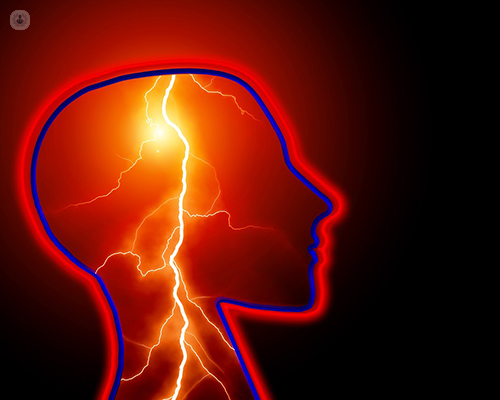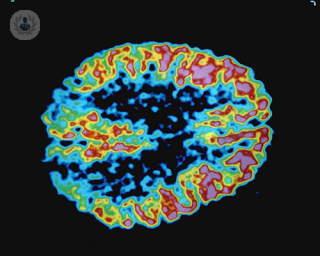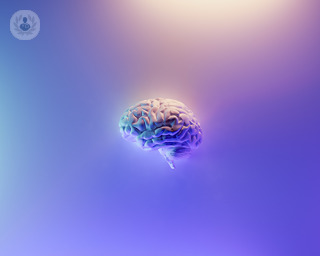What is epilepsy?
Epilepsy is a neurological disorder that causes recurrent seizures in the person suffering. These seizures appear when groups of nerve cells (neurons) in the brain send out erroneous signals. This can cause violent muscle spasms or even a loss of consciousness.
What are the symptoms of epilepsy?
The symptoms of epilepsy vary from one person to another. They emphasize the episodes of confusion, the loss of awareness and violent tremors. Some people have a strange sensation before suffering a seizure, which can be for example be a tingling sensation or emotional changes.

There are different categories of seizures which include:
- Focal seizures – caused by abnormal activity in one area of the brain. These can happen either without loss of consciousness (changes in smell and taste with involuntary jerking of a body part) or with impaired awareness (staring into space, and not responding normally).
- Generalised seizures – caused by abnormal activity in the whole brain, of which there are six types (absence seizures, tonic seizures, atonic seizures, clonic seizures, myoclonic seizures, tonic-clonic seizures).
What causes epilepsy?
There are multiple causes of epilepsy; from diseases, brain injuries and abnormal brain development. However, in many cases the cause that produces it is unknown.
Among the most common causes are:
- traumatic brain injury
- dementia
- brain tumour
- abnormal blood vessels in the brain
- infections
- stroke
Can epilepsy be prevented?
There is no form of prevention for epilepsy, however, eating a proper diet, sleeping the recommended amount of hours and avoiding drugs and alcohol can decrease the likelihood of triggering seizures in people with epilepsy.
What is the treatment for epilepsy?
The treatment for epilepsy consists of anti-seizure medication, lifestyle changes (e.g. adopting the ketogenic diet has shown some success in reducing seizures) and surgery. Surgery involves removing part of the brain causing the seizures, however, this is not always possible. Additional therapies can include vagus nerve stimulation and deep brain stimulation. A neurologist works to treat epilepsy.
11-13-2012 10-13-2023Epilepsy
Dr Dougall McCorry - Neurology
Created on: 11-13-2012
Updated on: 10-13-2023
Edited by: Aoife Maguire
What is epilepsy?
Epilepsy is a neurological disorder that causes recurrent seizures in the person suffering. These seizures appear when groups of nerve cells (neurons) in the brain send out erroneous signals. This can cause violent muscle spasms or even a loss of consciousness.
What are the symptoms of epilepsy?
The symptoms of epilepsy vary from one person to another. They emphasize the episodes of confusion, the loss of awareness and violent tremors. Some people have a strange sensation before suffering a seizure, which can be for example be a tingling sensation or emotional changes.

There are different categories of seizures which include:
- Focal seizures – caused by abnormal activity in one area of the brain. These can happen either without loss of consciousness (changes in smell and taste with involuntary jerking of a body part) or with impaired awareness (staring into space, and not responding normally).
- Generalised seizures – caused by abnormal activity in the whole brain, of which there are six types (absence seizures, tonic seizures, atonic seizures, clonic seizures, myoclonic seizures, tonic-clonic seizures).
What causes epilepsy?
There are multiple causes of epilepsy; from diseases, brain injuries and abnormal brain development. However, in many cases the cause that produces it is unknown.
Among the most common causes are:
- traumatic brain injury
- dementia
- brain tumour
- abnormal blood vessels in the brain
- infections
- stroke
Can epilepsy be prevented?
There is no form of prevention for epilepsy, however, eating a proper diet, sleeping the recommended amount of hours and avoiding drugs and alcohol can decrease the likelihood of triggering seizures in people with epilepsy.
What is the treatment for epilepsy?
The treatment for epilepsy consists of anti-seizure medication, lifestyle changes (e.g. adopting the ketogenic diet has shown some success in reducing seizures) and surgery. Surgery involves removing part of the brain causing the seizures, however, this is not always possible. Additional therapies can include vagus nerve stimulation and deep brain stimulation. A neurologist works to treat epilepsy.


Vagus Nerve Stimulation
By Mr Richard Selway
2024-12-30
Epileptic seizures can be dangerous and require treatment. In this article, we spoke with Mr Richard Selway, a highly experienced neurosurgeon who is based in London. He let us know how seizures can be treated with Vagus Nerve Stimulation (VNS). We found out some of the risks and side effects from this surgery and what the steps are to prepare for the procedure See more


Epilepsy – the 6 types of seizures
By Mr Richard Selway
2024-12-30
Epilepsy is a neurological disorder affecting 1 in 100 people in the UK, and it is characterised by seizures. Typically, seizures may involve uncontrolled, jerky movements, but in fact, did you know that there are 6 different types of seizure? Mr Richard Selway of the London Neurosurgery Partnership describes the characteristics of each type of seizure. See more


Epilepsy (Part 2): Treatment
By Dr Katia Cikurel
2024-12-30
Epilepsy is a chronic neurological disorder, characterised by the onset of recurrent seizures (abnormal electrical activity in the brain), that affects 50 million people of all ages worldwide. Following on from the first part on epileptic seizures and the diagnosis of epilepsy, renowned consultant neurologist Dr Katia Cikurel, offers a comprehensive insight into the medical concerns for women who are diagnosed and the most common treatments available. See more


What causes epilepsy and do seizures shorten a person’s life?
By Dr Dora Lozsadi
2024-12-30
Epilepsy is a neurological disease, characterised by attacks or seizures that recur in episodes over time. Doctor Dora Lozsadi talks about the underlying brain abnormality that causes epilepsy and how epilepsy can reduce a person's life expectancy. See more
Experts in Epilepsy
-
Professor Matthew Walker
NeurologyExpert in:
- Epilepsy
- Parasomnias
- Restless legs syndrome
- Narcolepsy
- Hypersomnia
- Sleepwalking
-
Mr Richard Selway
NeurosurgeryExpert in:
- Epilepsy
- Epilepsy surgery
- Spinal surgery
- Trigeminal neuralgia
- Brain tumour
- Parkinson's disease
-
Dr Dougall McCorry
NeurologyExpert in:
- Neurological disorders
- Epilepsy
- Headache
- Medicolegal
- Amnesia
- Whiplash
-
Dr Jeremy Rees
NeurologyExpert in:
- Neuro-oncology
- Brain tumour
- Epilepsy
- Headache
- Paraneoplastic syndromes
- Migraine
-
Dr Anke Hensiek
NeurologyExpert in:
- Neurological disorders
- Headache
- Multiple sclerosis
- Epilepsy
- Parkinson's disease
- Memory disorder
- See all

The International Clinic London
The International Clinic London
10 Harley Street
No existe teléfono en el centro.
By using the telephone number provided by TOP DOCTORS, you automatically agree to let us use your phone number for statistical and commercial purposes. For further information, read our Privacy Policy
Top Doctors

The Park Hospital - part of Circle Health Group
The Park Hospital - part of Circle Health Group
Sherwood Lodge Drive, Burntstump Country Park, Arnold, Nottinghamshire NG5 8RX
No existe teléfono en el centro.
By using the telephone number provided by TOP DOCTORS, you automatically agree to let us use your phone number for statistical and commercial purposes. For further information, read our Privacy Policy
Top Doctors

Cleveland Clinic Moorgate Outpatient Centre
Cleveland Clinic Moorgate Outpatient Centre
55 Moorgate, EC2R 6BH
No existe teléfono en el centro.
By using the telephone number provided by TOP DOCTORS, you automatically agree to let us use your phone number for statistical and commercial purposes. For further information, read our Privacy Policy
Top Doctors
-
The International Clinic London
10 Harley Street, W1G Marylebone LondonExpert in:
- Addictions
- Anxiety
- Panic attacks
- Depression
- Fertility
- Child Psychology
-
The Park Hospital - part of Circle Health Group
Sherwood Lodge Drive, Burntstump Country Park, Arnold, Nottinghamshire NG5 8RX, ArnoldExpert in:
- General Surgery
- Maxillofacial Surgery
- Oral surgery
- Plastic surgery, reconstructive and aesthetics
- Obstetrics and Gynaecology
- Podiatry
-
Cleveland Clinic Moorgate Outpatient Centre
55 Moorgate, EC2R 6BH, Central LondonExpert in:
- Digestive
- Cardiology
- Dermatology
- Diagnostic Imaging
- Diagnostics
- Obstetrics and Gynaecology
- See all
- Most viewed diseases, medical tests, and treatments
- Immunotherapy
- Alzheimer's disease
- Tension headache
- Peripheral nerve block
- Child nutrition
- Migraine
- Maternal mental health
- Paediatric rheumatology
- Autoimmune diseases
- Joint pain







